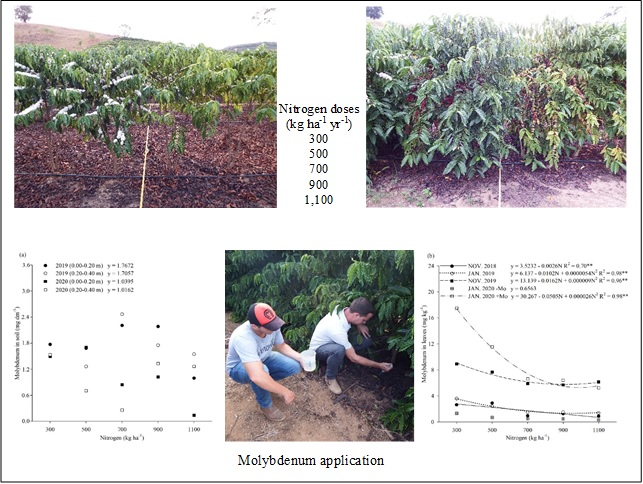Soil chemical properties and nutrition of conilon coffee fertilized with molybdenum and nitrogen
11/Nov/2021
ABSTRACT Molybdenum (Mo) availability is strongly affected by soil pH, which determines the dynamics of electrical charges and the adsorption of molybdate. This study evaluated the effects of nitrogen (N) and Mo application on the chemical properties of a Latossolo Amarelo (Oxisol) and in Coffea canephora nutrition and productivity throughout two productive cycles under field conditions. The experiment was conducted from June 2018 to May 2020. The experimental design used was in randomized blocks, in a 2 × 5 factorial […]
Sampling Design of Soil Physical Properties in a Conilon Coffee Field
01/Apr/2017
ABSTRACT Establishing the number of samples required to determine values of soil physical properties ultimately results in optimization of labor and allows better representation of such attributes. The objective of this study was to analyze the spatial variability of soil physical properties in a Conilon coffee field and propose a soil sampling method better attuned to conditions of the management system. The experiment was performed in a Conilon coffee field in Espírito Santo state, Brazil, under a 3.0 × 2.0 […]
Dry matter and macronutrient accumulation in fruits of Conilon coffee with different ripening cycles
01/Feb/2014
The period between anthesis and fruit ripening varies according to the Conilon coffee (Coffea canephora) genotype. Therefore, the time of the nutritional requirements for fruit formation may differ, depending on the formation phase and the genotype, and may directly affect split application of fertilizer. The aim of this study was to quantify the accumulation of dry matter and N, P, K, Ca, Mg and S at several stages in the fruit of the Conilon coffee genotype with different ripening cycles, […]
Relationship between zinc content in coffee plants and soil availability according to the soil extractant
01/Oct/2007
Two species of coffee (Coffea arabica L. and Coffea canephora Pierre) are cultivated in Brazil, but most research on Zn fertilization to date has focused on C. arabica. This study was carried out to determine the functional relationship between soil Zn availability determined by DTPA and Mehlich-1 extractors and Zn content in coffee plants belonging to the species C. arabica, cv. Mundo Novo IAC 379-19 (MN) and C. canephora, cv. Apoatã IAC 2258 (AP), as well as grafted plants (MN/AP). […]
Establishment of DRIS norms for organic and conventional conilon coffee in the State of Espírito Santo (Brazil)
01/Jun/2006
Conilon coffee (Coffea canephora) is very important for the economy of the state of Espírito Santo and its organic cultivation is increasing. However, there is a lack of information on leaf reference values for this form of management, as well as a nutritional diagnosis. The objective of this study was to establish and compare reference patterns and to propose adequate values of leaf nutrient concentrations obtained on high yielding conilon coffee plantations, cultivated under organic or conventional systems, in the […]
Absorption, translocation and utilization of zinc, copper and manganese in grafted seedlings of Coffea arabica
01/Apr/2006
There are complexes feedback mechanisms involving the relationship rootstock/scion, whick can positively or negatively affect the plant nutrient efficiency use. The goal of the present work was to evaluate the efficiency of uptake, translocation and utilization of Zn, Cu and Mn in coffee seedlings. The experiment was carried out in a greenhouse over 170 days using circulating nutrient solution in pots with sand medium. Four Coffea arabica L. genotypes were used as grafts: Catuaí Vermelho IAC 15 and Oeiras MG […]
Relationships between soil class and nutritional status of coffee plantations
01/Apr/2005
Farm planning requires an assessment of the soil class. Research suggest that the Diagnosis and Recommendation Integrated System (DRIS) has the capacity to evaluate the nutritional status of coffee plantations, regardless of environmental conditions. Additionally, the use of DRIS could reduce the costs for farm planning. This study evaluated the relationship between the soil class and nutritional status of coffee plants (Coffea canephora Pierre) using the Critical Level (CL) and DRIS methods, based on two multivariate statistical methods (discriminant and […]
Efficiency of uptake, translocation and use of calcium, magnesium and sulphur in young Coffea arabica plants under the influence of the rootstock
01/Oct/2003
Studies into the nutritional efficiency of grafted coffee plants is essential for the selection of graft/rootstock combinations for a maximum development and production. Our objective was the evaluation of the influence of rootstocks on the efficiency of uptake, translocation and use of Ca, Mg, and S in young Coffee arabica L. plants in hydroponic cultivation. The experiment was conducted in a greenhouse and lasted 170 days, using sand as substratum and circulating nutritive solution. Four genotypes of Coffea arabica L. were […]

